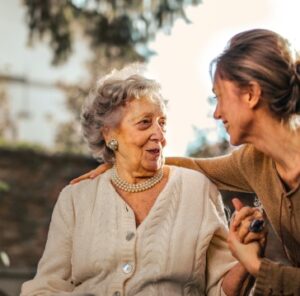As our loved ones grow older, many of us begin to take up the role of caring for them. If your parents, grandparents or anyone else from the older generation have loved and nurtured you through your childhood and into your adult years, there is a natural reversal of roles as they age. In many cultures, elderly people are at the heart of their family and community, traditionally regarded as deserving of protection and care from the younger generation after a lifetime of giving.
 But caring for your loved ones as they get older can often present a number of challenges, particularly if you are not part of a culture which promotes close-knit families and communities. The role of caring for elderly people often falls on their children or a close relative one generation below them. These carers are typically people in their 50s and 60s who may also have their own children to look after, are still in employment and lead very active lives.
But caring for your loved ones as they get older can often present a number of challenges, particularly if you are not part of a culture which promotes close-knit families and communities. The role of caring for elderly people often falls on their children or a close relative one generation below them. These carers are typically people in their 50s and 60s who may also have their own children to look after, are still in employment and lead very active lives.
So how do you make sure you are in the position to care for your loved ones as they grow old? If you anticipate having to take up this role at some point in the future, planning is crucial. The sooner you start putting plans in place, the better. Here, we take a look at some of the things you can do to prepare:
Domiciliary care or residential care?
One of the biggest decisions to be made is whether your loved one wishes to receive care at home (domiciliary care) or move into residential care. There are a wide variety of reasons for choosing one over the other and they all need to be carefully considered and are often a matter of personal preference.
Some people may decide that they wish for their loved one to move in with them, and for anyone thinking about this option it’s worth looking at the support that may be available for this type of situation.
To find out more about the benefits of home care, read our blog here. [link to ‘benefits of home care’ blog]
Talk to other family members
Talking to your loved ones about how they wish to be cared for as they get older is important in being able to put the right plans in place. It’s also vital to involve other family members in the conversation if they are likely to be sharing the responsibilities of looking after your loved ones. Bring everyone together for an in-depth discussion, and make sure to do it well before the care is needed. This allows for time to prepare a well-considered and agreed plan for the future.
Listen to everyone involved and bear in mind that elderly couples might not both have the same idea as each other for what they want. If there are differing views, try to find some common ground. If members of the younger generation are being looked to for support as caregivers, they should consider realistically the practical and emotional implications of this on their lives.
If possible, discuss financial arrangements too, as there is bound to be some cost involved in whatever support is chosen.
Financial considerations
As we’ve already mentioned, whatever kind of care your loved ones choose to receive as they get older, there’s no doubt that some of it will need paying for. How much you pay will depend on a number of factors, including income, savings, any benefits being received, the level of support needed and where the care takes place.
It’s best, therefore, to start saving for this as soon as you can. This should also be an area of discussion with your loved ones well before it will be needed, to enable plans to be put in place. It might work for everyone involved to pool their resources by making a monthly contribution to a savings pot.
Legal documents and other written agreements
As we all get older, we need to ensure we have prepared certain legal documents such as a will and power of attorney. Age UK has some useful information on this which you can find here [https://www.ageuk.org.uk/information-advice/money-legal/legal-issues/]
As well as the legal documents, it’s also a good idea to write down the responsibilities of everyone involved in ensuring the wishes of your loved one are met. It’s also worth drawing up a contingency plan in case the arrangements need to change, for example if one of those intended to share responsibility is unable to do so.
Continued Care has been established for 30 years and our director Samantha Harrison is well-regarded as an expert in the health and social care industry. Contact us for any information or advice about caring for your loved ones as they get older.


